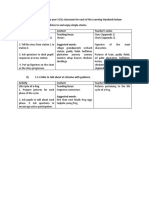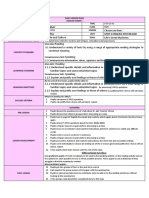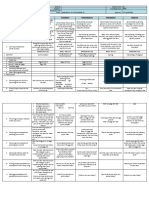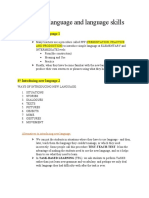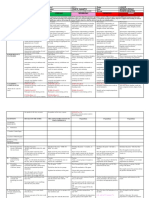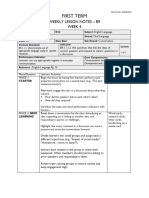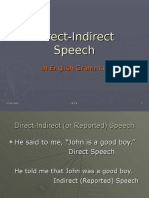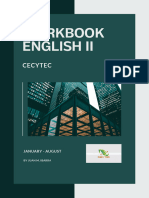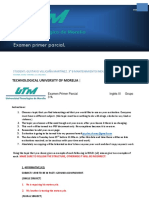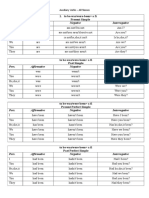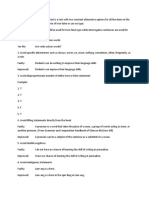DEPARTMENT OF STATE EDUCATIONAL RESEARCH AND TRAINING
BRIDGE COURSE LITERATURE
CLASS 8 - SECOND LANGUAGE ENGLISH
General Instructions:
* This Bridge course material is for the year 2023-24.
* This material will help teachers to identify the learning gaps of the learners.
* Facilitators are free to design and modify activities according to the need and
learning level of their class.
* Facilitators should make sure that they are ready with the required TLMs and
instructions before getting into the class.
* Facilitators are required to conduct pre-test and post-test based on the prescribed
learning outcomes.
* Facilitators should frame their own pre/post test questions depending on
classroom situation. You can refer to the sample questions given at the end and
frame your own pre/post test question paper.
D Learning Outcomes Learning Suggested Instructions to conduct
a Elements Activities the activities
y
1 Pre-test :The Facilitator
Facilitator should will conduct ● The facilitator
conduct a pre-test the paper- prepares the
based on the pencil test question paper
Learning Outcomes based on the based on the
of the earlier class, previous learning outcomes
considered in this knowledge of of the earlier class.
bridge course. the students.
Page 1
�2 Listening skill : Recognising 1.Slapping ● The facilitator will
sight words . the board. write a few words
Listens to /reads ( activity ). on the BB.
excerpts, dialogues, A: an, are, a,
at, as, and,
poems, after, all, ● The facilitator calls
about,
commentaries of B: by, be, been, out the word .
sports and games, but
C: could, can,
speeches, news, called ● The student has to
debates on TV, radio D: do, did, run to the board and
down
and expresses E: each, eat, slap the correct
opinions about them. exam, word that is called
F: for, find,
first, from out.
G: go, get. give
Note : The sight H: he, his, him,
words are taught. her, have, has, 2.Word
had, how family
I: in, if, I, into, ● Facilitator gives a
is, it, its anchor chart list of jumbled
J: just, juice,
jug, joker words and asks the
K: know, knew,
L: long, like, students to identify
little the words that
M: may, made,
my, more, belong to the word
make, many, family.
most
N: no, not, now
O: one, of, on, ● Example: The
or, over, other,
only, out facilitator writes
P: people
Q: quite ‘ch’ on the board
R: rain, right, and the students
run
S: she, so, said, must pick the words
some, see that belong to ‘ch’
T: to, the, they,
time, this, than, words and write
there, two,
their, that, them on the board .
them, these,
then
U: use, up ● chest, chain, chair,
V: very choice, change etc.
W: with, what, 3. Forming
was, we, when,
were, which, new words
will, would,
who, way,
water, words,
where
X:Xerox, x-ray
Y: you, your,
yes ● Facilitator prepares
Z:zeal, zero
flip cards to frame
https://youtu. new words as
be/YkXoHh7 shown in the video
2xrg and introduces
words .
Page 2
� https://youtu.be/3DI6YO
0GjRg
3 1. Antyakshari
● Building 4.Engage
vocabulary your students ● Facilitator provides
a word.
● Reinforce with hands- Example: water.
ment of the on learning ● The first student
sight words fun should tell a word
. activities. beginning with the
letter ‘r’.
● Students who fail to
give the word is out
of the game.
● Continue the game
until you have a
winner.
https://youtu.be/Di
UN7s8Xo4M
2. Word Race
Page 3
� ● Facilitator draws
four columns on the
board and asks four
students to come
near the board. Each
student will take a
column.
● Facilitator will tell
the participants to
write the words
based on her
instruction.
Example : The facilitator
will say ‘Write words that
have yellow colour.’ Each
participant might write in
their column: sun, banana,
mango, sweet corn ,
school-bus etc. Whoever
writes the maximum
number of words first is
the winner.
Note: Facilitators should
use the sight words
repeatedly during the
bridge course.
Page 4
�4 Speaking skill ● Students ● Ball ● The Facilitator
● Engages in frame game draws a picture with
conversations simple ● Picture clue words and then
in English with sentences Reading asks the students to
family, friends, using the frame sentences
and people from sight using those words.
different words. ● In the next step the
professions facilitator will draw
such as only the pictures
shopkeeper, and then ask the
salesperson students to frame
etc., using meaningful
appropriate sentences looking at
vocabulary. the pictures.
5 ● Uses ● Speaks ● Introduce different
sentences simple types of language
which are sentences functions required
required in the in the class :
in school, school, For eg: What’s your
home, home, name ?
ground, play Please move etc.
shop . ground,
shop etc.
6 Uses polite Introduces 1. ● Facilitator writes
expressions in himself / Introducing the sentences used
everyday herself. oneself in the while introducing
conversations in class. oneself in the class.
different situations/ 2.
shares simple Introducing ● Students look at the
exchanges their friends. board and introduce
themselves and
their friends.
https://youtu.be/gghDRJ
VxFxU
Page 5
�7 Uses polite 1.Introductio ● Introduce different
expressions in n of polite types of
conversations expressions polite expressions and
. their structures with
meanings.
E.g.1. “Open the door,
2.Simple please”
polite “Please give me a
expressions paper” etc.
2 “Could you please give
3.More me a pen?”
polite 3. “Would you mind
expressions opening the window?” etc.
● Introduce the polite
expressions used in
different situations.
● Eg: Hospital, Bank,
Offices etc.
8 Engages in
conversation Using polite ● Practising ● Divide the class into
with people of expressions in the 4 groups, provide
different different examples different situations
professions. situations and ask learners to
practise the use of
polite expressions.
● Let us
● Give some common
speak
expressions and ask
politely
learners to convert
them into polite
expressions.
Eg: Give me your
notebook- Please
give me your
notebook.
Page 6
�9 Reading Skill: Reads stories 1. Pick & ● Different types of text
& read activity and poems are put in a
Reads aloud poems box. Learner picks and
stories / recites reads aloud with
poems with proper pause,
appropriate intonation and
pause, intonation pronunciation. Give
and necessary feedback.
pronunciation. 2. Read your ● Provide learners
story / text. newspaper cuttings
and ask them to read it
aloud.
● Glue different types of
3. Read the text on the wall. Let the
newspaper learners move to the
aloud wall and read the texts
aloud.
● Instruct learners to
Reads textual / non- 4. Read the collect any story or
textual materials in texts glued to poem of their choice
English / Braille with the wall for the next class.
comprehension
Page 7
�10 Reading train 1. Loud ● Ask the learner to read
time-table, reading the story/poem aloud
map, which he/she has
wrappers, brought, with proper
pamphlets, intonation and
poems, stories, 2. My pronunciation.
passages. partner's ● Exchange the texts,
collection ask them to read it
aloud to the class.
3. Read the ● Observe the
surprise pronunciation &
passage. intonation. Provide a
passage and ask them
to read it aloud to the
whole class.
4. Read a ● Ask the learner to
familiar read any familiar
passage passage aloud. Eg: A
passage from the
English Reader.
Page 8
�11 Identifies the Identifies/ 1. ● Introduce different
different types uses Introduction types of sentences.
of sentences. different (assertive,
types of interrogative,
sentences/ exclamatory,
changes imperative)
types of 2. Examples ● Introduce multiple
sentences examples for each
from one type of sentence.
type to 3. Add an ● Ask the learners to
another example add one more
example to each
type of sentence.
4. Categorize ● Provide slips with
the different types of
sentences sentences. Learners
categorize them into
4 types.
12 Uses appropriate
grammatical forms Uses
in communication. appropriate 1. Change ● Narrate any incident
Verb forms the time in simple present
tense in 4-5
sentences. Then
change it to simple
2. Timeline past tense.
activity ● Give one more
incident and ask
learners to change
the tense. Draw a
timeline on the
board and mark
past, present &
3. Change future time.
the word ● Learners change the
according to words according to
the time. the time and write
under the timeline.
4. Change ● Provide words in
with time. chits. Learners
change the same
words into other
tenses.
Page 9
�1 Writing Skill: Identifies 1. Letter ● Introduce the format
3 parts of a Writing of formal letter
Writes formal letter / writing. Give
notices, formal Writes a importance to the
letters, formal letter aspects of letter
descriptions. 2. writing. Eg: Writing
Introduction date, addressing,
to subject, conclusion,
letter writing signature etc.
● Provide some sample
formal letters and ask
3. Sample learners to observe
leave letter and note down the
observation. features of the letter.
● Provide one sample
leave letter and ask
4. Copy the learners to copy it.
leave letter Focus on the positions
of aspects like date,
place, signature etc.
5. Write a ● Ask learners to write a
leave letter leave letter to their
to the class class teacher. Make
teacher necessary corrections.
14 Writes a 1. My ● Describe your
descriptive favourite favourite food item
text food item/ in 5-6 sentences
subject/ without naming it.
person/ game
2. Guess Eg: “My favourite
me! food is made from
3. Can you Ragi.” “It is round
tell? in shape” “It can be
4. Describe swallowed with
the object. sambar” etc. Let the
learners guess the
Page 10
� food item. Then the
learners write
descriptions about
their favourite food
item on a sheet of
paper and display it.
Others try to name
the food item. (This
activity can be
repeated using any
other concept such
as describing a
house, a pet etc.)
15 Post test: The facilitator should conduct a post test based on the Learning Outcomes
PRE TEST/POST TEST
Sample questions (just for reference only)
1.Make 5 words beginning with the letters given below:
D: _______________________________________
V: _________________________________________
2. Frame a sentence using the words given below:
Rain: _________________________________________
Juice :______________________________________
3. Briefly introduce yourselves to your classmates. ( oral )
4. Choose the correct polite expression from the four options, based on the given
situation.
You want to talk to your Headmaster. How will you ask?
a. Do you have a minute, sir? b. I want to talk.
c. Excuse me, Sir. d. Shall we talk ?
5. Convert the given sentence into a polite expression :
Give me a glass of water.
6. Facilitator provides textual / non-textual materials to assess the reading skill of the
student. ( ORAL )
Page 11
�7. Facilitator provides train time-table, map, wrappers, pamphlets, poems, stories,
passages. Asks comprehension questions based on the material provided.
8. What type of sentences are the following? (assertive, interrogative, exclamatory,
imperative)
1. The grass is green. __________________________
2. What a tall building!___________________
9. Change the given sentences into past tense :
1. Ravi plays football.
2. Shalini drinks water.
10. Write a few sentences about your favourite food item/ person.
Or
Write a leave letter to your class teacher requesting him/her to grant you two days'
leave stating your own reason.
Page 12










